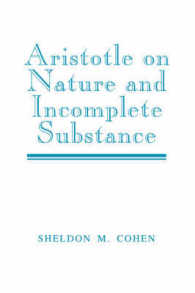基本説明
Divided into five general sections: ID and its connection to genetics, relationships, cognitive development, socio-emotional development, and development of language.
Full Description
Though the tremendous amount of recently-emerged developmentally-oriented research has produced much progress in understanding the personality, social, and emotional characteristics of persons with intellectual disabilities (ID), there is still much we don't know, and the vast task of precisely charting functioning in all these areas, while also identifying the associated fine-tuned, complex, and intertwined questions that crop up along the way, seems daunting and insurmountable.
The goal of The Oxford Handbook of Intellectual Disability and Development is to update the field with new, precise research and sophisticated theory regarding individuals with ID provided by seasoned developmental theorists who have made original conceptual contributions to the field. This volume is divided into five general sections (ID and its connection to genetics, relationships, cognitive development, socio-emotional development, and development of language), with each focused on a domain of functioning or aspect of life that is inherent to an integrated, transactional perspective of development. While developmental approaches to understanding persons with intellectual disability will continue to emerge, this comprehensive volume is a must-read for specialists and developmental psychologists who must have the conceptual foundations for examining the developmental trajectories across persons with any of the many different ID etiologies.
Contents
Part One: Introduction and Overview ; 1. The More You Know the Less You Know, But That's OK: Developments in the Developmental Approach to Intellectual Disability ; Jacob A. Burack, Natalie Russo, Heidi Flores, Grace Iarocci, and Edward Zigler ; Part Two: Genes and Behavior ; 2. Behavioural Genetics, Genomics, Intelligence, and Mental Retardation ; Grace Iarocci and Stephen A. Petrill ; 3. The Contribution of Developmental Models towards Understanding Gene-to-Behavior Mapping: The Case of Williams Syndrome ; Mayada Elsabbagh & Annette Karmiloff-Smith ; 4. Linking Genes to Cognition: The Case of Fragile X Syndrome ; Kim M. Cornish, Armando Bertone, Cary S. Kogan, and Gaia Scerif ; Part Three: Cognitive Development ; 5. The Organization and Development of Spatial Representation: Insights from Williams Syndrome ; Barbara Landau ; 6. Understanding the Development of Attention in Persons with Intellectual Disability: Challenging the Myths ; Grace Iarocci, Mafalda Porporino, James T. Enns, and Jacob A. Burack ; 7. Memory and Learning in Intellectual Disabilities ; Stefano Vicari ; 8. Short-Term Memory and Working Memory in Mental Retardation ; Christopher Jarrold and Jon Brock ; 9. Executive Function across Syndromes Associated with Intellectual Disabilities: A Developmental Perspective ; Natalie Russo, Tamara Dawkins, Mariette Huizinga, and Jacob A. Burack ; 10. Musical Ability and Developmental Disorders ; Anjali K. Bhatara, Eve-Marie Quintin, and Daniel J. Levitin ; 11. Brain-Based Methods in the Study of Developmental Disabilities: Examples from ERP and MRI Research ; Alexandra P.F. Key and Tricia A. Thornton-Well ; Part Four: Language Development ; 12. Language Development in Childhood, Adolescence, and Young Adulthood in Persons with Down Syndrome ; Robin S. Chapman and Elizabeth Kay-Raining Bird ; 13. Literacy Development in Childhood, Adolescence, and Young Adulthood in Persons with Down Syndrome ; Elizabeth Kay-Raining Bird and Robin S. Chapman ; 14. Language Development in Fragile X Syndrome: Syndrome-Specific Features, Within-Syndrome Variation, and Contributing Factors ; Leonard Abbeduto, Andrea McDuffie, Nancy Brady, and Sara T. Kover ; 15. Language Development in Williams Syndrome ; Carolyn B. Mervis ; Part Five: Social-Emotional Development ; 16. Emotional Development in Children with Developmental Disabilities ; Connie Kasari, Laudan Jahromi, and Amanda Gulsrud ; 17. Socio-emotional and Brain Development in Children with Genetic Syndromes Associated with Developmental Delay ; Alison Niccols, Karen Thomas, and Louis A. Schmidt ; 18. The Assessment and Presentation of Autism Spectrum Disorder and Associated Characteristics in Individuals with Severe Intellectual Disability and Genetic Syndromes ; Joanna Moss, Patricia Howlin, and Chris Oliver ; Part Six: Family and Context ; 19. Family Well-being and Children with Intellectual Disability ; Laraine Masters Glidden ; 20. Dyadic Interaction between Mothers and Children with Down Syndrome or Williams Syndrome: Empirical Evidence and Emerging Agendas ; Penny Hauser-Cram, Angela N. Howell-Moneta, and Jessica Mercer Young ; 21. Parenting and Mental Retardation: An attachment perspective ; Rinat Feniger-Schaal, David Oppenheim, Nina Koren-Karie, and Nurit Yirmiya ; 22. Children with Down Syndrome: Parents' Perspectives ; Michal Al-Yagon and Malka Margalit ; 23. Child Eliciting Effects in Families of Children with Intellectual Disability: ; Proximal and Distal Perspectives ; Deborah J. Fidler ; 24. Life Course Perspectives in Intellectual Disability Research: The Case of Family Caregiving ; Anna J. Esbensen, Marsha Mailick Seltzer, and Marty Wyngaarden Krauss ; Part Seven: Conclusions and Future Directions ; 25. On Knowing More: Future Issues for Developmental Approaches to Intellectual Disabilities ; Jacob A. Burack, Robert M. Hodapp, Grace Iarocci, and Edward Zigler ; Index






